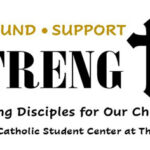
Sisters Nguyen Thi Trinh and Nguyen Thi Trang share breakfast in their home in Vietnam. Since 2016, Catholic Relief Services has been working in the farming community of Binh Dao commune, working to increase the resiliency of family farming in the face of increasingly unpredictable weather patterns.
By Lindsay Steele
The Catholic Messenger
Many Catholics are familiar with CRS Rice Bowl, a Lenten fundraiser for Catholic Relief Services (CRS), but fewer may be aware of the scope of its humanitarian work.
CRS, founded in 1943, is the overseas relief and development agency of the U.S. Conference of Catholic Bishops. CRS is more than a yearly Rice Bowl collection and more than “a big organization doing things thousands of miles away,” said Deacon Joe Welter, who was assigned at his 2017 ordination to support diocesan CRS efforts.
With the creation of a diocesan CRS chapter, and a university chapter on the way, Catholics will have year-round opportunities to support global relief efforts. For several years, Deacon Welter and Kent Ferris, diocesan director of Social Action, worked to expand local CRS participation beyond the Lenten Rice Bowl, “but we weren’t getting much more interest in CRS and what you can do at a local level,” Deacon Welter said.
That changed in March 2020 when Alysson Riutta, volunteer manager for CRS’ Midwest region, contacted the diocesan Social Action Office about the organization’s desire to expand outreach through creation of local CRS chapters. She said the chapter concept, developed in 2019, aims to bring people together in a structured setting to organize local activism and fundraising efforts.
“The great thing about chapters is they allow Catholics in the U.S. to still participate in CRS’ mission even if they aren’t international aid workers or advocates,” Riutta said.
After speaking to Riutta, Ferris consulted with Bishop Thomas Zinkula, who gave his blessing to move forward. “It has been said that Catholic Social Teaching is the best kept secret in the Church,” Bishop Zinkula said. “Along these lines, I would suggest that the work of Catholic Relief Services is the best kept secret of Catholics in the United States providing monumental assistance to poor and vulnerable persons overseas who are suffering greatly due to disease and poverty. I witnessed their impressive, inspirational outreach firsthand when I visited a program in India a couple of years ago.”
With the bishop’s encouragement, Ferris recruited Deacon Welter, who saw the chapter model as an “answer to a prayer,” and felt optimistic about its potential to increase CRS awareness and involvement in the Diocese of Davenport.
Even while dealing with the uncertainty of the COVID-19 pandemic, Ferris and Deacon Welter worked to gauge interest in chapter formation. They reached out to people they thought might be interested in joining, and spoke during virtual presentations in December and January.
As interest grew, it became clear that the best path forward would be to start a diocesan group, and to train and meet virtually. The 12 prospective members of the diocesan CRS chapter began a four-part virtual orientation in March, with each session lasting about 90 minutes. They completed orientation earlier this month. The diocesan chapter is the first CRS chapter in Iowa, Riutta said.
Members will meet monthly to participate in a national chapter call and discuss local initiatives. The national chapter calls provide opportunities to get updates on relevant legislative actions and hear experts’ stories. “There is also a skill-building element” where chapter members can learn how to set up meetings with Congress, write effective letters to the editor and engage in social media campaigns, she said.
Deacon Welter said the meetings offer guidance on where chapters can most effectively focus their efforts that month. In May, the diocesan group worked on a social media campaign. This summer, the group plans to set up meetings with U.S. senators and representatives when they return home for recess. “We will take training and get ready,” Deacon Welter said.
Riutta emphasized that CRS is a nonpartisan organization, focusing on specific issues and not political party agendas. Deacon Welter added, “We are trying to support things that are in Catholic Social Teaching: dignity of the human person, support of the common good and protecting people’s right to food, water and education.”
Several chapter members have ties to the University of Iowa’s Newman Catholic Student Center in Iowa City, which plans to establish a chapter in the fall. Diocesan chapter member April Rouner, development director for the Newman Center, said CRS gives her an opportunity to “do Christ’s work for our brothers and sisters throughout the world.” She believes that a university chapter will provide students the opportunity to tap into the “great resources” CRS provides in the areas of leadership, fundraising and advocacy.
The Newman Center chapter will operate under the “CRS University” model and, like the diocesan chapter, will be the first in Iowa. The two chapters, separate entities, will complement each other’s efforts, organizers said.
Newman Center is in the process of hiring a donor-funded student leader to help the university chapter through the 2021-22 school year. “For a student to have that background and experience will hopefully set them up for a long life of social justice and service. It will also be a good resume builder,” Rouner said.
Ferris said he’s grateful so many diocesan Catholics have embraced the CRS chapter concept. “It has been particularly gratifying to see both the laity and clergy supportive of this.”
What is CRS?
The U.S. Catholic Bishops founded Catholic Relief Services (CRS) in 1943 to assist the poor and vulnerable overseas. CRS is the official international relief and development agency of the U.S. Catholic community. CRS provides emergency supplies to families in other countries following disasters and assists with food, water and housing. In poverty-stricken areas of the world, CRS provides better agricultural practices, public health information, microloans to help individuals or groups to start a business, and a number of other ways to assist people to help themselves. CRS operates in more than 90 countries. For more information go to http://crs.org/











